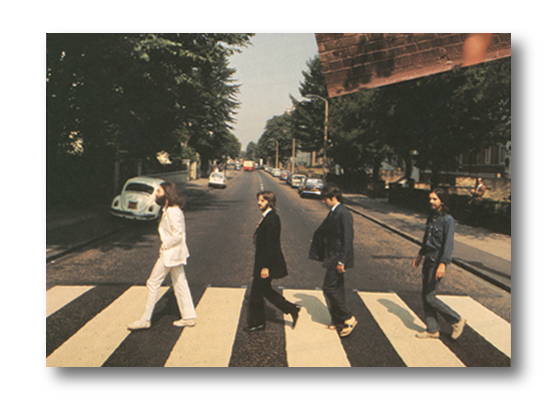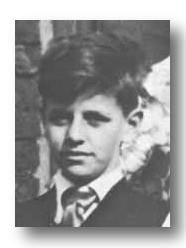Did You Know That...?
BEATLEMANIA
 Beatlemania
descended on the British Isles in October 1963, just as the Christine Keeler-Profumo
scandal fizzled out. It didn't lift for three years, by which time it had spread
and had covered the whole world. There was perpetual screaming and yeh-yehing
for three years, one long continuous succession of hysterical teenagers of every
class and color, shouting uncontrollably, not one of whom could hear what was
going on for fhe noise of each other. Each of them emotionallv, mentallv, or
sexuallv excited, foaming at the mouth, bursting into tears, hurling themselves
like lemmings in the direction of the Beatles or just simply fainting.
Throughout the whole of the three years it was happening somewhere in the world.
Each country witnessed the same scenes of mass emotion, scenes which had never
been thought possible before and which are un- likely to be ever seen again.
Writing about it now makes it all sound like fiction. It is impossible to
exaggerate Beatlemania because Beatlemania was in itself an exaggeration. No
words can fully describe those scenes, although every major newspaper in the
world has miles of words and pictures in its clipping library, giving
blow-by-blow accounts of what happened when the Beatles descended on their part
of the globe. Once it had stopped, bv 1967, and everyone was either overcome by
exhaustion or boredom, it was difficult to believe it had all happened. Could
everyone have been so mad? It wasn't just teenagers; people of all ages and all
intellects had succumbed, though perhaps not all as hysterically as the
teenagers.
Beatlemania
descended on the British Isles in October 1963, just as the Christine Keeler-Profumo
scandal fizzled out. It didn't lift for three years, by which time it had spread
and had covered the whole world. There was perpetual screaming and yeh-yehing
for three years, one long continuous succession of hysterical teenagers of every
class and color, shouting uncontrollably, not one of whom could hear what was
going on for fhe noise of each other. Each of them emotionallv, mentallv, or
sexuallv excited, foaming at the mouth, bursting into tears, hurling themselves
like lemmings in the direction of the Beatles or just simply fainting.
Throughout the whole of the three years it was happening somewhere in the world.
Each country witnessed the same scenes of mass emotion, scenes which had never
been thought possible before and which are un- likely to be ever seen again.
Writing about it now makes it all sound like fiction. It is impossible to
exaggerate Beatlemania because Beatlemania was in itself an exaggeration. No
words can fully describe those scenes, although every major newspaper in the
world has miles of words and pictures in its clipping library, giving
blow-by-blow accounts of what happened when the Beatles descended on their part
of the globe. Once it had stopped, bv 1967, and everyone was either overcome by
exhaustion or boredom, it was difficult to believe it had all happened. Could
everyone have been so mad? It wasn't just teenagers; people of all ages and all
intellects had succumbed, though perhaps not all as hysterically as the
teenagers.

John - Paul -
George - Ringo
 |
John lives
in a large mock-Tudor house on a private development full of mock-Tudor
houses in Weybridge, Surrey. Ringo lives in the same development. John's
house cost him in all 60,000 pounds, although it was only 20,000 pounds
to buy. He spent another 40,000 pounds doing it up, knocking rooms
around, decorating and furnishing, landscaping the garden, and building
a swimming pool. He has spent too much on it, which he knows. "I
suppose I'd only get half the money back if I sold it, about 30,000
pounds. I'll need to find a pop singer to sell it too, someone soft
anyway." In the garden he has a psychedelically painted caravan,
matching the patterns of his painted Rolls-Royce. The house is on a
slight hill, with the grounds rolling beneath. There is a full-time
gardener, a housekeeper called Dot, and a chauffeur called Anthony. None
of them lives in. |
 |
Paul is
the only London Beatle. He lives in a large detached three-story house
in St. John's Wood, near Lord's cricket ground and just round the corner
from EMI's recording studios. He bought it at the end of 1966 for 40,000
pounds. He didn't do much knocking about, compared with John and Ringo.
Paul spent nothing on some things, such as the garden It became a
jungle, completely overgrown, inhabited only by the prowling Martha.
When he'd moved in it had been very pretty. Everybody kept on at him,
especially his dad, to do something about it. He seemed to delight in
its wildness and the way it annoyed some people. But at the end of 1967,
he decided to start having it spruced up. He got the idea of building a
magical house in it, a sort of pagoda on a raised platform with an open
glass roof onto the skies.
|
 |
George has
a very long, low single-story brightly painted bungalow at Esher. It's
on a private development, owned by the National Trust, very similar to
the one where John and Ringo live. You enter the estate through a
gateway from the main road, then go into what looks like the wooded
gardens of a stately home. You can't see any houses at first. They are
hidden from the roadway, all very secluded and lush-looking. They're
named, not numbered, so it's impossible to find any of them. George's is
the hardest to find. The name of his house, Kinfauns, is not even on his
house or in his garden. The driveway to it looks at first to be part of
another house. The bungalow has two wings to it which enclose a
rectangular court- yard at the back. In this he has a heated swimming
pool. All the outside walls of the house have been painted by George, or
at least sprayed, in bright luminous-looking colors. From his gardens
the house looks like a psychedelic mirage.
|
 |
Ringo
lives around the corner from John in the same private housing
development in Weybridge, Surrey. It is also a large mock-Tudor house.
It was built in 1925 and is called Sunny Heights. It cost him 37,000
pounds, plus 40,000 pounds to do it up. It hasn't got a swimming pool
like John's or George's but it has much bigger grounds, with lots of
trees and shrubs. It backs onto St. George's Hill Golf Course. Neither
Ringo nor John is a member of the club and neither has ever asked to be.
But when they moved in one newspaper reporter asked the club if the
Beatles could be members. He was told no, there was a long waiting list.
Ringo says he wouldn't join anyway. He doesn't dig walking. Ringo's
garden has had a lot of very expensive landscaping done to it. At the
back, the house now looks down into a huge amphitheater dug out of the
ground. It has lots of brick terraces and ponds which you walk down and
into from the French windows of the main drawing room. There are little
woods at either side of this amphitheater, still part of Ringoís
garden. Up one tree there is a large playhouse.
|
AFTER
JOHNíS DEATH
 One
of the effects of John's death was that the three remaining ex- Beatles
immediately became highly concerned about security matters. They had tried to
live fairly private lives after the split, and go their various ways. Since
1980, they have realized that even as private figures they must take great care.
Ringo today lives behind the well-guarded gates of Tittenhurst Park, a
seventeenth-century stately home with some 74 acres near Ascot in Berkshire. His
personal life became rather complicated after the Beatles ended and he has
changed homes and countries several times.
One
of the effects of John's death was that the three remaining ex- Beatles
immediately became highly concerned about security matters. They had tried to
live fairly private lives after the split, and go their various ways. Since
1980, they have realized that even as private figures they must take great care.
Ringo today lives behind the well-guarded gates of Tittenhurst Park, a
seventeenth-century stately home with some 74 acres near Ascot in Berkshire. His
personal life became rather complicated after the Beatles ended and he has
changed homes and countries several times.
Source: Radio Gold
Home - Discography - News -
Did You Know...?
- Tabs & Lyrics - Real
Audio,Video -
Links - Contact Me